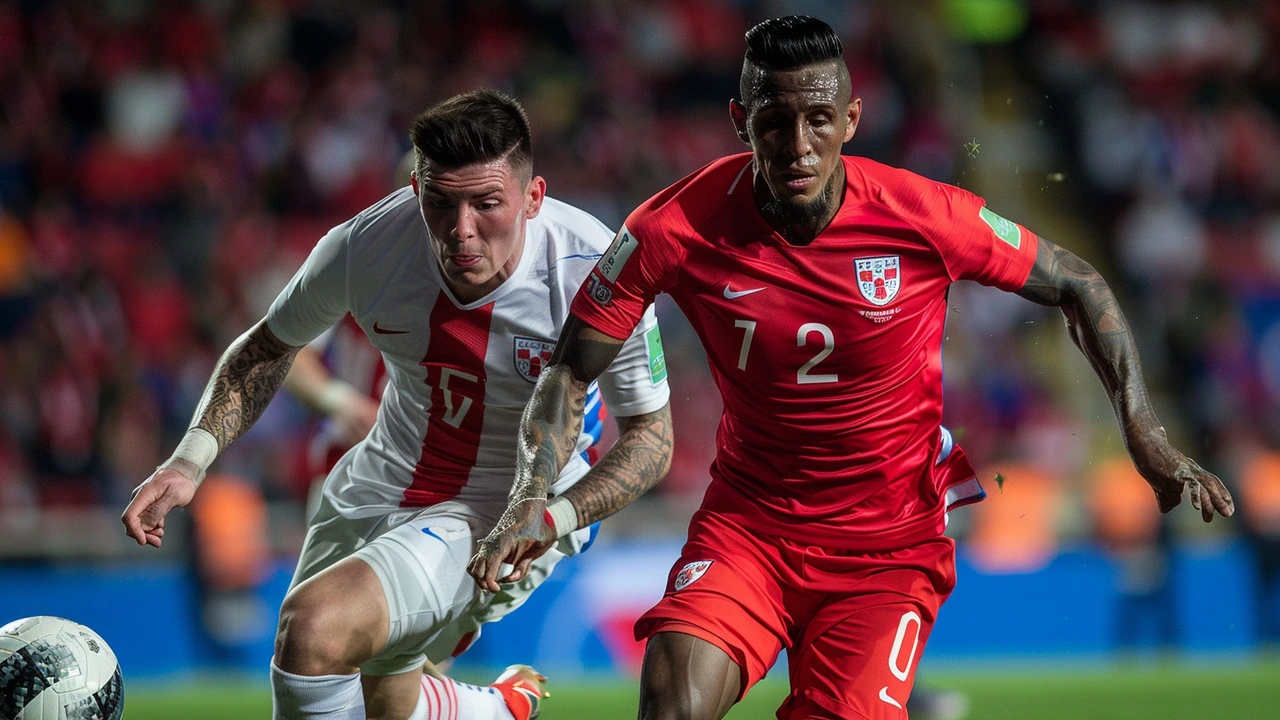Canada’s Historic Advancement in Copa America
In their inaugural Copa America appearance, the Canadian national football team has truly made waves. Securing a quarterfinal spot with a goalless draw against Chile at the Inter&Co Stadium stands as a significant achievement. This milestone was marked by a resilient performance from Maxime Crepeau, the Portland Timbers' goalkeeper, who delivered three crucial saves to deny Chile.
The Game Changer: Red Card for Chile
Chile's chances were dented early when Gabriel Suazo received a red card in the 27th minute, reducing his team to ten players for the remainder of the match. Despite this advantage, the Canadian team struggled to break down the now defensive Chilean side. Gabriel Arias, the Chilean goalkeeper, was instrumental in maintaining the clean sheet for his team with two decisive saves.
Canada’s Unyielding Defense
Canada's road to the quarterfinals wasn't just about their performance against Chile. It was also influenced by other results in the group stages. Argentina’s 2-0 win over Peru played a crucial role in confirming Canada’s progression. The Canadians will face a sterner test ahead, but their defense led by Crepeau has shown they can hold their own against seasoned South American teams.
Chile’s head coach Ricardo Gare's absence due to a one-match suspension added another layer of difficulty. Gare's suspension was a result of a halftime delay during Chile's previous match against Argentina. Despite these setbacks, Chile managed to hold their ground and frustrate Canada.
Argentina Defeats Peru, Secures Group Stage Dominance
Meanwhile, Argentina showcased their dominance in the group stages, maintaining a perfect record. They secured a 2-0 victory over Peru at the Hard Rock Stadium in Miami, despite missing star player Lionel Messi due to injury. Lautaro Martinez stepped up in Messi’s absence, scoring both goals for the team. The first goal was particularly memorable, with Martinez finishing a perfectly timed assist from Angel Di Maria.
Despite the absence of their head coach Lionel Scaloni due to a suspension, Argentina controlled the match with a 74% possession rate and six shots on target. Nicolas Tagliafico saw a goal disallowed, and Leandro Paredes missed a penalty. Nevertheless, Emiliano Martinez’s crucial save ensured a clean sheet for Argentina, further demonstrating their formidable defensive capabilities.
Canada’s Historic Win Over Peru
In the group stage, Canada secured their first-ever victory over Peru, adding a historic feather in their cap. This early success was a strong indicator of their potential in the tournament. With this victory and the draw against Chile, Canada aims to join a select group of teams that have won multiple matches in their inaugural Copa America campaigns. Only Uruguay, Mexico, and Honduras have achieved this feat in the past.
The Journey Ahead
Looking forward, Canada’s progression into the knockout stages marks a significant achievement for a country traditionally more focused on ice hockey than football. This accomplishment will serve to inspire young players and potentially transform the landscape of Canadian football.
As the tournament progresses, Canada will need to leverage their defensive strength and convert their attacking opportunities. The upcoming matches will provide a stern test for the squad, and they will need to display resilience and tactical acumen. For the Canadian supporters, this campaign in South America is already historic, symbolizing a turning point for football in the nation.
The excitement is palpable as Canada prepares to face their next challenge, and football fans across the country will undoubtedly be glued to their screens, cheering on their national heroes.


Mike Malone
It is a remarkable milestone for a nation whose sporting identity has long been synonymous with ice rather than grass; the Canadian squad has transcended expectations by securing a quarter‑final berth in their inaugural Copa America campaign.
One must acknowledge the tactical discipline exhibited throughout the tournament, a testament to the coaching staff's meticulous preparation.
The draw against Chile, albeit goalless, underscores a defensive solidity rarely seen from a side in its debut continental foray.
Maxime Crépeau's three decisive interventions were not merely moments of individual brilliance but pivotal contributions that preserved the team's composure under pressure.
Equally noteworthy is the psychological resilience displayed after the early red card to Chile’s Gabriel Suazo, which could have emboldened Canada yet instead the team maintained a measured approach.
The lack of a definitive breakthrough might be critiqued, but the ability to stifle a traditionally potent South American offense reflects a strategic acumen that belies the squad's relative inexperience.
One should also consider the broader context of the group stage, where Argentina's victory over Peru effectively paved the path for Canada’s advancement, illustrating the interconnected nature of tournament dynamics.
Nevertheless, the Canadian side must now prepare for a sterner test, as the knockout rounds will invariably pit them against higher‑caliber opposition.
Historical precedents show that inaugural appearances often culminate in early exits, yet Canada appears poised to defy this narrative.
The emerging talent pool, bolstered by players gaining exposure in competitive leagues abroad, augurs well for future campaigns.
Moreover, this achievement may catalyze a cultural shift, inspiring youth participation and garnering increased investment in football infrastructure across the nation.
From a tactical standpoint, the defensive framework-anchored by a disciplined backline and a goalkeeper of Crepeau’s calibre-provides a solid foundation to build upon.
Transitioning from defense to attack remains an area for refinement; the team's offensive execution will be crucial for progression beyond the quarter‑finals.
In sum, Canada's historic progression is a confluence of defensive fortitude, strategic poise, and the intangible momentum generated by an unprecedented cup run.
It will be fascinating to observe how this newfound confidence translates into performance on the pitch in the forthcoming stages.